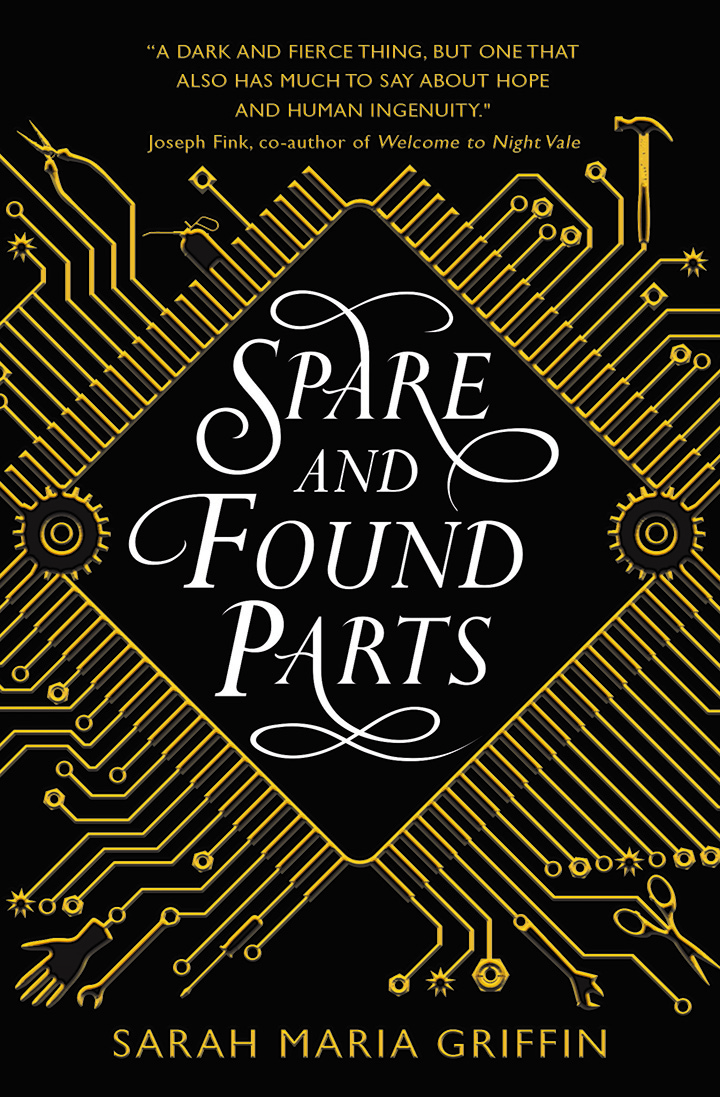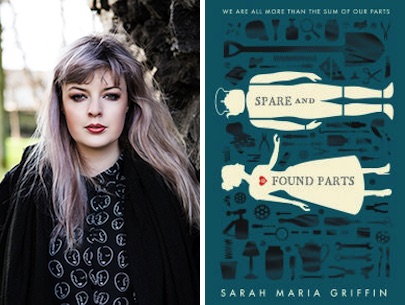When Sarah Maria Griffin moved to America in 2012, she found herself dealing with feelings that must be familiar to many emigrants. “Floundering, facing unemployment and missing her hometown of Dublin,” she decided to write her way through those dark days. That’s how her quarter-life memoir, Not Lost: A Story About Leaving Home, happened, and Griffin acknowledges that her first novel proper deals with some of the same themes:
It’s a story about alienation and anxiety, and how that can drive a person to create—against all odds. It’s also about technology and religion, and where those things meet and divide. It took until after it was finished to realise that ultimately it’s a book about making something in order to feel less alone in the world, which is far from what it started out as.
Spare and Found Parts started out as an idea that came from “a conversation with a friend about Frankenstein,” a source of inspiration that can still be spotted in the synopsis:
Nell Crane has never held a boy’s hand.
In a city devastated by an epidemic, where survivors are all missing parts—an arm, a leg, an eye—Nell has always been an outsider. Her father is the famed scientist who created the biomechanical limbs that everyone now uses. But she’s the only one with her machinery on the inside: her heart. Since the childhood operation, she has ticked. Like a clock, like a bomb. And as her community rebuilds, everyone is expected to contribute to the society’s good… but how can Nell live up to her father’s revolutionary ideas when she has none of her own?
Then she finds a lost mannequin’s hand while salvaging on the beach, and inspiration strikes. Can Nell build her own companion in a world that fears advanced technology? The deeper she sinks into this plan, the more she learns about her city—and her father, who is hiding secrets of his own.
Nell’s city—it’s called Black Water—stands in for Dublin in Spare and Found Parts, and, as the author herself professes, “was very much borne of a homesickness.” Well, there’s no cure for homesickness as unquestionably effective as homecoming—and Griffin, happily, has come home; her haunting cautionary tale has just taken a little longer to bust through customs.
Released to great acclaim overseas in 2016, Spare and Found Parts is finally out early next year in the UK and Ireland—not to mention New Zealand—thanks to the fine folks at Titan, and they’ve been good enough to give us an exclusive look at the beautiful black and gold motherboard-come-cover:

Interested yet? Then check out this excerpt. It’s all you’re going to need, guaranteed.
The room was vast and white and clean, as though they had slipped through a tear in their rotting world into a blank canvas, a fresh void. A cool breeze whispered from a spinning fan on the ceiling, high above them. A chill rolled over Nell’s skin; she hadn’t felt something like that in a long time. The air felt fresh.
Cleaning solution lingered on the edge of Nell’s senses; she could nearly taste it. Like bleach and, under the bleach, lavender. Like a place that had been cared for, constructed. As if all the badness of this building’s past was being scrubbed out. The walls were lined with shelves and glass cases full of silver boxes of all shapes and sizes. This was an inventory.
These were the computers.
Spread out evenly on the clean white tables were tiny parts, silvery things, and delicate tools. Thin wires lined up by color, by size. So many small things. But none of this was what Nell was really looking at.
Three people were dancing near the wall farthest from where they came in. Whatever was blasting through the air was definitely music. Delight, when it arrives out of no place at all, is like an electricity that runs through passages in bones and out through hands and up into mouths. It is a beautiful shock. Nell nearly screamed with joy.
One of them shouted, “Turn off the light!”
“Calm down. I’m doing it, I’m doing it.” Rua laughed and flipped the switch on the wall again. The room went black.
Something was projected onto the wall. Images of stars. People. Or at least, they looked like people. A crowd, a band, drawn in moving pictures. A million colors against the fresh, clean dark of the room, alive, racing past. It looked as if someone had split open a crystal and cast a torch through the prism.
Nell’s eyes filled with hot tears, and she stretched her arms above her head. Rua and the other three were dancing without inhibition, eyes locked on the display on the wall.
The images moved with the music; yes, that was what it was. But Nell had never heard these instruments before. These thrumming strange rushes: fractals of light in a broken violin, someone playing a heart like a drum, like ten beautiful drums, repeating melody, looped and looped and escalated. Like something shattered but shattered right.
She didn’t even feel that she was in her body anymore.
A voice rang out. Not a human voice. Almost, but full of stars. A computer’s voice.
She loved it.
It sang out three words—One more time—a mantra, and the others sang along and waved glasses in the air. They knew this song. Again and again it sang, and Nell lifted her voice along with it, understanding it immediately.
For a moment the beat disappeared, a soft, tender lull of electric tone ran beneath the voice, and they slowed their dance in reverence, chanting, “One more time, one more time.” In the dark, Nell could see that Oliver wasn’t dancing. She didn’t care.
The beat reappeared slowly, crept up out of nowhere, and the five picked up their movement until it peaked and they were lost, each, in the sound and the color, the strangeness and newness of it. It glittered in the air, if sound could glitter. Nell’s whole body shone; her machine heart was beating a pulse exactly in tempo. This music was far from the janky accordion and double bass of the Bayou, the flat guitars, the salvaged, busted instruments and torch songs from dead times. This was so different. It shone. Nell wept, a smile splitting her face until it ached, as she sang easy new words with these strangers.
The song ended with three dense strikes of a bell.
The screen flickered off, and Nell was in the dark again; but the world was more illuminated than when she began. She was sweating but not summer, city sweating. She thrummed, not yet ready for this to be over. She looked around, waved her arms a few more times, hoping the galactic orchestra would pick back up, but nothing. It was over. The pace of the world was slow again.
Spare and Found Parts by Sarah Maria Griffin is slated for publication in Great Britain and beyond on February 6, 2018. In the US, it’s available now from Greenwillow Books.
Niall Alexander is an extra-curricular English teacher who reads and writes about all things weird and wonderful for The Speculative Scotsman, Strange Horizons, and Tor.com. He lives with about a bazillion books, his better half and a certain sleekit wee beastie in the central belt of bonnie Scotland.










